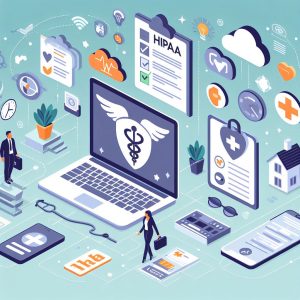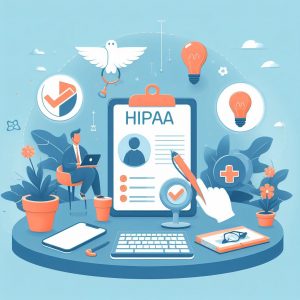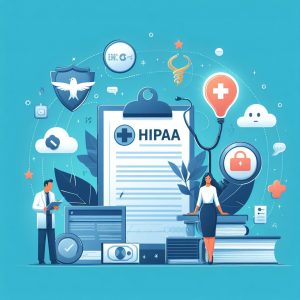HIPAA Certification Steps for Data Privacy & Security
Table of Contents
Achieving HIPAA compliance is a critical step akin to earning a professional license in the medical field, vital yet demanding, and often requires obtaining a certificate through thorough HIPAA training.
Understanding the nuances involves navigating complex regulations that safeguard patient information and ensure patient confidentiality – a journey requiring diligence, attention to detail, and thorough knowledge of the healthcare legal landscape.
1. Understanding HIPAA Certification
HIPAA certification is a structured process that verifies an organization’s compliance with the regulations protecting sensitive patient data, aiming to ensure the privacy, patient confidentiality, integrity, and availability of healthcare information.
Achieving certification involves comprehensive audits and assessments conducted by accredited third-party organizations specializing in healthcare compliance.
2. What HIPAA Stands For:
The acronym HIPAA stands for the Health Insurance Portability and Accountability Act, a comprehensive federal law enacted in 1996 to enhance healthcare standards.
HIPAA safeguards sensitive patient information, maintaining patient confidentiality, availability, and integrity to protect against unauthorized access.
HIPAA primarily aims to keep personal healthcare information private and secure, ensuring that organizations dealing with such data follow stringent privacy and data protection regulations.
It covers a broad spectrum of entities—ranging from healthcare providers to insurance companies—mandating meticulous data handling practices to minimize the risk of data breaches.
3. Importance of HIPAA Certification:
Obtaining HIPAA certification signifies compliance with federal healthcare regulations.
This certification, an essential marker of a trustworthy entity handling sensitive health information, ensures adherence to the stringent requirements set by the Health Insurance Portability and Accountability Act. Certified organizations thus demonstrate their commitment to upholding high standards of data privacy and security.
Furthermore, having HIPAA certification is a competitive advantage in the health sector. It builds credibility with clients and partners, showcasing the organization’s dedication to protecting health information and mitigating potential risks related to data breaches.
In practical terms, HIPAA certification reduces the likelihood of costly penalties and legal actions stemming from non-compliance. By implementing best practices in data management, organizations not only protect sensitive information but also promote a culture of security awareness and responsibility within their operations.
4. Steps to Get HIPAA Certified
To begin the HIPAA certification process, you first need to conduct a comprehensive risk analysis to identify vulnerabilities in your systems handling protected health information (PHI) and prepare for obtaining the official certificate. This involves assessing potential threats, existing security measures, and areas that require improvement.
Next, implement the necessary administrative, physical, and technical safeguards to address identified risks and ensure compliance with HIPAA regulations.
Assessing Requirements
Understanding HIPAA requirements is critical, and obtaining a certificate is a formal acknowledgment of this understanding.
Organizations must start by determining the specific aspects of HIPAA that apply to their operations. This involves analyzing how they handle protected health information (PHI), which includes data creation, storage, transmission, and disposal. Additionally, they must ensure all administrative, physical, and technical safeguards are in place to protect PHI.
Conduct a thorough gap analysis.
This will involve contrasting current policies and practices with HIPAA requirements to identify areas that need improvement. It’s essential to draft a comprehensive action plan to address any deficiencies.
In addition to internal assessments, consider engaging third-party auditors with expertise in HIPAA compliance to ensure a thorough evaluation. They can provide valuable insights and recommendations to bolster your compliance efforts.
Choosing a Certification Body
Selecting a suitable certification body is vital for successful HIPAA certification.
- Reputation: Choose a certification body with a strong reputation in healthcare compliance.
- Experience: Ensure they have considerable experience in HIPAA assessments and certifications.
- Accreditation: Confirm the certification body is officially accredited to conduct HIPAA certifications.
- Methodology: Understand their assessment and certification methodology for comprehensiveness.
- Support: Look for bodies that provide continuous support and consultation throughout the process.
Carefully evaluate each certification body based on these criteria.
Choosing the right body helps ensure thorough and accurate HIPAA certification.
5. Training and Compliance
Employees’ adequate HIPAA training is crucial for maintaining HIPAA compliance. Regular sessions should focus on privacy policies, security measures, and proper handling of protected health information (PHI), enabling staff to recognize and mitigate potential breaches effectively.
In addition to initial training, ongoing education is critical, commonly known as “continuous compliance.” This can be achieved through regular updates on regulatory changes, refresher courses, and internal audits. By fostering an environment of continuous learning and vigilance, organizations can significantly reduce the risk of non-compliance and ensure ongoing adherence to HIPAA standards.
Training Programs Available:
Various HIPAA training programs are available to help individuals and organizations achieve HIPAA compliance effectively.
- Online Self-Paced Courses: Ideal for busy professionals, these courses offer flexibility and cover crucial HIPAA regulations.
- Instructor-Led Training: Provides real-time interaction with experts, beneficial for in-depth understanding and immediate clarification of doubts.
- Workshops and Seminars: Excellent for immersive learning experiences, typically involving practical exercises and group discussions.
- Certification Programs: Comprehensive courses designed to equip learners with the necessary knowledge and skills to achieve formal HIPAA certification.
- Custom Corporate Training: Tailored sessions to meet specific organizational needs, ensuring all personnel are adequately informed about HIPAA requirements.
Online self-paced courses are popular due to their accessibility and time-efficient structure.
Instructor-led trainings cater to those who prefer guided learning experiences with direct access to industry professionals.
Workshops and seminars provide hands-on experience and foster interactive learning, essential for complex regulatory frameworks like HIPAA.
6. Meeting Compliance Standards
To ensure HIPAA compliance, developers must familiarize themselves with the core principles and mandates of the regulation. This includes understanding privacy rules, security measures, and breach notification standards.
- Compliance begins with conducting a comprehensive risk assessment of the organization’s data handling processes.
- Identifying potential risks and vulnerabilities is a crucial step in fortifying data security frameworks.
- Subsequently, deploying administrative, physical, and technical safeguards is essential for robust data protection.
- Periodically reviewing and updating security protocols ensures continued adherence to HIPAA standards.
- Regular training and awareness programs for staff members are vital to maintain a culture of compliance.
Ultimately, the goal is to create a seamless integration of HIPAA compliance into daily operations. Ensuring compliance from the development stage through final implementation is key to avoiding costly breaches and legal ramifications.
7. Maintaining HIPAA Certification
Maintaining HIPAA certification requires consistent vigilance and proactive management. This involves conducting regular internal audits, security risk assessments, and up-to-date policy revisions to stay compliant with evolving regulations.
Continuous training programs and employee awareness initiatives are necessary to reinforce a culture of compliance and mitigate potential risks.
Ongoing Education
Ongoing education is crucial for sustaining HIPAA compliance and ensuring privacy protection.
Employees must partake in continuous education to stay abreast of regulatory changes, ensuring that their knowledge remains current. Regular workshops, webinars, and training sessions should be implemented to provide employees with comprehensive updates on new regulations and industry best practices.
Additionally, engaging in a community of practice can be beneficial. By connecting with other professionals in the field, employees can share insights, discuss challenges, and stay informed about emerging trends and technologies that impact HIPAA compliance.
Finally, maintaining documentation of all educational activities is imperative. This not only demonstrates adherence to HIPAA’s training requirements but also helps in assessing the effectiveness of the ongoing education initiatives, thereby ensuring continuous improvement and better compliance.
Regular Audits
Regular audits are essential to maintaining HIPAA compliance.
By conducting thorough internal audits on a periodic basis, you can proactively identify potential vulnerabilities and rectify them before they turn into breaches. It is advisable to have a structured audit plan that includes reviewing policies, procedures, and safeguards, ensuring they meet HIPAA standards.
Furthermore, third-party audits can provide an unbiased evaluation of your compliance status. External auditors bring expertise and a fresh perspective, identifying issues that internal teams might overlook due to familiarity with existing processes.
Finally, documenting all audit activities is critical. Detailed records of findings, corrective actions taken, and follow-up measures demonstrate your commitment to continuous compliance. This documentation also serves as crucial evidence during official compliance reviews, thereby reducing the risk of penalties.



